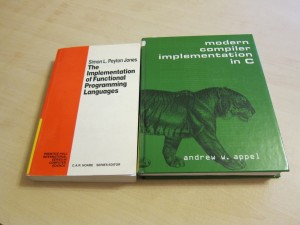Some books about compilers
Online Compilers course at Stanford University began last Monday. Although it should be self-containing I still prefer to have some books at hand, especially that I’ll be leaving for 10 days and I want to self-study material for the next week. On Monday I’ve paid a visit to my university’s library. Here’s a quick glimpse at some literature that I’ve found.
First of all, there’s the Dragon Book, officially known as “Compilers: Principles, Techniques, and Tools”, by Aho, Lam, Sethi, and Ullman. This is a classic originally published in 1986. There’s nothing to worry though - there was no revolution in the field of compiler construction, so what was true in 1986 is mostly still valid now. The book was re-released in 2006 with some updates about garbage collection and code-optimization (OK, I lied, there was some progress in a few aspects of compiler engineering). I have a Polish edition of the first edition. In fact I borrowed it long before the course had started hoping to read it on my own. The book is very detailed and extremely verbose (750 pages total) which is a bit discouraging to me. I’ve read only a couple of sections so I don’t have a clear opinion about it yet.
The second book recommended as a textbook for the Compilers course is “Engineering a compiler” by Cooper and Torczon. This one was more difficult to find. I just got it today and haven’t read it yet. With over 800 pages it’s longer than the Dragon Book. Skimming through the book I noticed that it seems to be detailed and precise and puts emphasis on practical aspects. Chapter about lexical analysis has a section about implementing a lexer. I’m looking forward to this one, since I still don’t have a clear vision on how to implement lexer efficiently. These are only the first impressions of course. I’ll verify them when I start reading (expect a follow-up on this one read a follow up on this one).
Third of the recommended books - “Modern compiler implementation in C/Java/ML” (there are three different editions of this book) by Appel - was also available in my library. I’ve already read the chapter about lexical analysis and I think that, contrary to the Dragon Book, it was a bit too concise. It covers the subject of Deterministic Finite Automata (DFA) and Non-deterministic Finite Automata (NFA), which luckily I am familiar with (more on that in a moment), so that wasn’t much of a problem. However if this was my first contact with DFAs and NFAs I would have some trouble understanding what it’s all about. I hope that the next chapters will be more detailed. I was very happy to see that this book has a chapters about functional languages and polymorphic types. The latter one covers the subject of the Hindley-Milner type inference algorithm in a form that seems to be accessible.
Now, here’s a surprise! Just a few days ago I found about a book The Implementation of Functional Programming Languages by Simon Peyton Jones (see my previous post). To my greatest surprise it was in the library! I stumbled upon it by pure accident while I was searching the shelves for Appel’s book - I never would have thought that it’s available in the library of my university. Do I have to mention that I borrowed it right away? I’ve read the Introduction and some random parts of the first chapter about the lambda calculus. I must say that the book looks very accessible so I hope to find some time to read at least couple of chapters. What’s interesting about the book (or rather about functional languages) is the fact that Haskell didn’t exist when this book was written, yet much of the code in the book is almost Haskell (in fact it’s Miranda).
I’ve got one more book entitled “Compiler construction” by Waite and Goos. This one is old (1984) and, aside from universal knowledge about parsing, semantic analysis, error handling an so on, it seems to cover many aspects that are a bit outdated. I think I’ll just rely on previous books and skip reading this one.
I also enrolled to Automata course. Initially I didn’t plan to do it, but I figured out that I can just give it a try and, if I won’t have enough time, I can simply download the videos and watch them during summer holiday. Luckily the first week covers the DFAs and NFAs so I got 100% from the first quiz without even watching the lectures. I’m afraid that next weeks won’t be that easy.
